28 January, 2019 | Publication, Resource and waste management
Professor David C Wilson has been working for the last two years with the Rwandan academic Telesphore Kabera to apply the Wasteaware indicators to benchmark performance of the solid waste management (SWM) and recycling system in Kigali, the capital of Rwanda. Their results form the basis of a paper published today in the first ever open access issue of the long established ISWA peer-reviewed journal Waste Management & Research. The paper uses previously unpublished results from the Wasteaware database to compare Kigali’s performance with four other East African capital cities – Dar-es-Salaam, Kampala, Nairobi and Maputo.
http://worklife.wharton.upenn.edu/sildenafil-online/
The Wasteaware benchmark indicators grew out of work originally carried out for UN-Habitat’s Soild Waste Management in the World’s Cities (2010). They provide a standardised method to characterise the performance of a city’s SWM and recycling system across some 15 indicators, some quantitative and some qualitative, covering both waste generation, the physical aspects of waste and resource management, and various governance aspects. Results for the first 40 cities were used extensively in UNEP and ISWA’s inaugural Global Waste Management Outlook (2015). They are now being applied widely, both to characterise the baseline position in a city; to identify priority areas for improvement; and to monitor progress over time.
From this paper on East Africa, the stand-out result is the relatively high collection coverage achieved in two of the cities: in Maputo with extensive international technical assistance, and in Kigali using its own local resources. In both cases, governance factors are key. Kigali uses a public-private partnership (PPP), with exclusive franchises in 35 sectors being tendered every three years; households pay an affordable fee depending on their ability to pay (the service is free to the poorest category); 95% fee collection rates are achieved, partly through co-collection with charges for local security patrols, which is a service people value highly given the recent history of the country.
Another key priority to improve solid waste management across East Africa is to eliminate open dumping – only Kampala currently has an engineered disposal site. Recycling rates also need to be increased – only Nairobi currently has a good baseline to build on (30%). Common weaknesses include a lack of segregation at source; and of institutional capacity and of available and reliable waste data.
19 December, 2018 | Publication, Resource and waste management
Professor David C. Wilson’s final contribution to the CIWM Journal took the form of an interview in which he looked back on his Presidential year. This web-posting also includes an index of and links to his monthly columns for the CIWM journal, many of which were ‘think-pieces’ on issues in which he has been involved for years or even decades. Among the questions covered in the final interview were: has any topic dominated the year (yes, plastics – both marine plastics and the ‘China ban’); and what would be your advice to Enda Kiernan and future CIWM Presidents (‘Be true to yourself’ – which the editor also used as this month’s headline).
https://www.babyscanclinic.com/blog/order-generic-levitra/
Interviews and DCW’s theme for the year:
- Dec 2018: ‘Be true to yourself’. DCW looks back on his year as president. PDF attached at end of post.
- Dec 2017: A key utility service. DCW revisited his Presidential address to further explain his key themes for the year ahead. The overarching theme was to have solid waste management recognised as an essential utility service.
- Nov 2017: One small step. The editor Ben Wood introduced DCW, his story in waste and his hopes for his Presidential year. PDF attached at end of post.
Plastics:
- Oct 2018: Plastics – diabolic or fantastic? How to respond to the crisis of plastics entering our oceans? Which plastic uses are diabolic and which fantastic?
- Jun 2018: How to influence people. DCW reported on CIWM’s role in influencing the UK’s initiative on marine plastics which was announced at the Commonwealth Heads of Government Meeting in London in April 2018.
- Apr 2018: China – coming full circle. In the wake of the current China-induced recycling crisis in the West, DCW gave his personal perspective on China’s journey in waste management and recycling over the last 30-40 years and moving forward…
- Feb 2018: Turning the tide. Where do plastics entering the ocean come from, and how do we turn the tide?
Promoting waste reduction and recycling:
- Sep 2018: Charge! DCW reflected on the challenges of devising the right policies to charge households for solid waste management services
- May 2018: Revaluing recycling. DCW argued that we need to rethink recycling if it is to become sustainable and proposed a framework for doing so, by considering the embodied social, environmental and technical values alongside the market price.
- Jan 2018: Inspiring reuse. DCW showcased the five inspiring projects shortlisted for Best Reuse or Waste Prevention Project at the CIWM Sustainability and Resource Awards 2017.
Waste and climate
- Jul 2018: Don’t waste our climate. DCW made the case for resource and waste management as an entry point to achieve significant climate mitigation. The article was subsequently re-published by the National Solid Waste Association of India (NSWAI) in their member journal Waste Monitor in July 2019.
- Website May 2018: Uncontrolled burning of solid waste as a significant contributor to climate change. DCW reported on current research at Imperial College London.
Tackling the global waste crisis
- Website Nov 2018: DCW awards his Presidential Medal to Mike Webster, Founder and CEO of the charity Wasteaid.
- Website Oct 2018: Tackling the global waste crisis through community waste management. DCW reported on two papers in the peer-reviewed literature, which follow-up on the CIWM-Waste aid toolkit Making Waste Work.
- Dec 2017: A key utility service. A key theme for DCW’s Presidential year was to highlight the global waste crisis, the 3 billion people who lack access to basic SWM services.
- Website Nov 2017: DCW launches toolkit for community waste management. Introducing DCW’s Presidential Report, the CIWM-Wasteaid Toolkit Making Waste Work. The Toolkit includes a dozen How-to-do-it Guides to enable local entrepreneurs to implement simple technologies using organics and low-value plastics in the waste.
Other DCW areas of interest or ‘hobby horses’:
- Aug 2018: Hazardous waste – plus ça change. DCW reflected on 40 years of involvement with hazardous waste policy, and concluded that the current and future challenges identified by CIWM’s Hazardous Waste Special Interest Group have changed relatively little over the years.
- Mar 2018: Let’s skip “the tip”. DCW argued that terms such as “the tip”, “rubbish”, “refuse” and arguably “tipping”, have no place in the vocabulary of the professional waste and resource manager.
14 November, 2018 | Awards, Resource and waste management
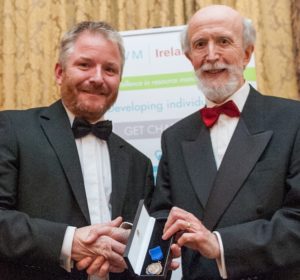
DCW hands over his CIWM Presidential Medal for 2018 to Mike Webster
https://www.babyscanclinic.com/blog/buy-cialis-tadalafil-online-20-mg/
At the CIWM Presidential Dinner at the Intercontinental Hotel in Dublin, after the inauguration of Enda Kiernan as the next President, DCW’s last act as the retiring President was to award his CIWM Presidential Medal for 2018. The recipient was Mike Webster, the founder and CEO of the new charity Wasteaid, which is working directly with local communities in some of the least developed countries to tackle the global waste crisis. The text of DCW’s speech is reproduced below.
‘Being able to award the President’s Medal is one of the perks of being President, and indeed the only thing that is expected of you after you hand over the chain…. The standard advice is to give it to someone who has particularly helped in my career or in my Presidential year.
I started out in 1974, so my early influencers are now either quite old or have already moved on to the great Circular Economy in the sky.
Looking back on my career, one of the aspects I take most pride in is the number of (then) young people whom I have either brought into the resource and waste sector, or to whose development I have made some contribution; and who I hope won’t be offended if I refer to them, tongue in cheek as, at least in part, my “protégées”.
I am also aware that, in the twilight of my own career, I am leaving behind much unfinished business. So, my thoughts here have gone to one of those protégées, whom I believe can take forward, and make a difference in, an area that is close to my heart. I devoted at least 20 years of my life to working with international organisations, national governments and large cities to develop integrated and sustainable waste management systems.
I have recently drawn attention to the global waste crisis, the more than 3 billion people worldwide who still lack access to basic solid waste management services, which reinforces the comparative failure of such top down approaches; yes, we have made some progress, but it is painfully slow, and corruption often impedes progress. So, I have come to the realisation that, in parallel, we also need to work from the bottom up.
This person is already making an impact, by opening-up opportunities for you and me, as individual resource and waste management professionals and as companies, to get involved and to make a real difference by helping local communities in some of the poorest countries to help themselves by making products to sell locally from the low value organics and plastics in the waste – thus helping to solve their local waste problems, keeping plastics out of the oceans AND giving themselves sustainable livelihoods to feed and educate their families.
This person has done this at considerable personal sacrifice, giving up a secure job to set up a new charity, initially drawing little or no salary while their children were still very young. The charity is now taking off, helped in part by the success of the CIWM-sponsored Toolkit; income has doubled this year, and looks set to triple that figure next year to more than a quarter of a million pounds.
The winner the 2018 CIWM President’s medal is Mike Webster, the Founder and CEO of our sector’s very own charity, Wasteaid.’
14 November, 2018 | Awards, Resource and waste management
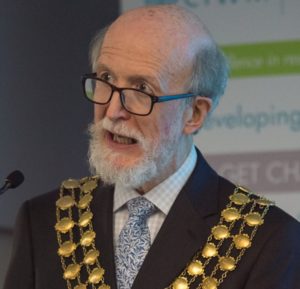
DCW gives his final speech as CIWM President
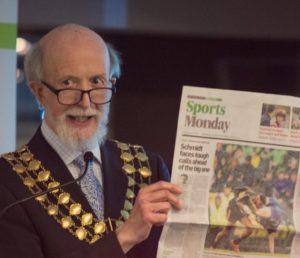
The Gaelic Football team which Enda Kiernan manages appeared in the lead photo story of the previous day’s Irish Times
Professor David C Wilson handed over the Presidency of CIWM, the UK and Irish professional body for resources and waste, to Enda Kiernan at the Aviva Stadium in Dublin on 13 November 2018. He highlighted plastics – both plastics entering the oceans and China’s ban on imports for recycling – as the dominant topic in his Presidential year. The public focus on marine plastics also helped dissemination of his Presidential report, the CIWM-Wasteaid Toolkit Making Waste Work; the website clocked 56,000 visits in its first year, with 7,000 downloads. DCW introduced his fellow Irishman, Enda Kiernan of Cork County Council as the next President. CIWM waited more than a century for its first Irish President; now we have had three in five years, and two in a row, although Enda is the first from the Republic of Ireland.
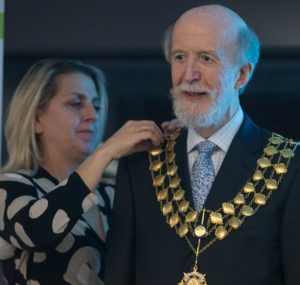
The chain of office is removed from DCW to pass over to Enda Kiernan
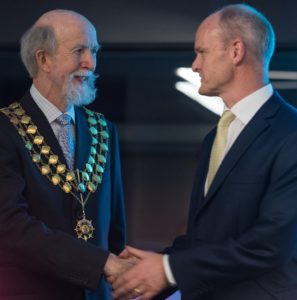
DCW congratulates Enda Kiernan on becoming the 103rd President of CIWM
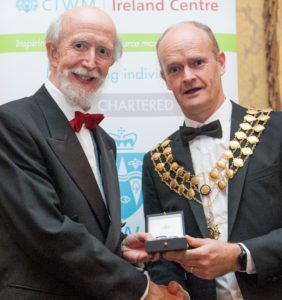
Enda Kiernan presents DCW with his Past President’s medal
31 October, 2018 | Conference, Resource and waste management
In his October column for the CIWM Journal, Professor David C Wilson reflects on the dominant story of his CIWM Presidential year, how we respond to the crisis of plastics entering our oceans. Which plastic uses are diabolic and should be banned, and which do we really need? One of his starting points was a recent CIWM-sponsored report which proposed a five-fold use-based categorisation of plastics. The other was the July Klosters Forum, which gathered 60 stakeholders from around the World to brainstorm on how to stem the flow of plastics into the oceans.
DCW proposes a three-way classification. At one extreme are the unacceptable, pointless, and often very short term (or ‘diabolic’) uses, which should be banned. At the other extreme are necessary or sustainable (‘fantastic’) uses, such as infection control, light-weighting cars and aircraft, and reducing food waste. In between is the largest category, which he labels as ‘indeterminate’. This can be further broken down into problem plastics, and replaceable plastics, which should both be phased out; and hard to replace plastics, where the focus should be on redesign and consolidation into a smaller number of truly ‘easy to recycle’ plastics used for ‘higher environmental value’ applications, such as preventing food waste.
14 October, 2018 | Publication, Resource and waste management
According to the UNEP and ISWA’s Global Waste Management Outlook (GWMO), three billion people lack access to basic solid waste management (SWM) services; addressing this global waste crisis would not only vastly improve their lives but also halve the weight of plastics entering the oceans. Professor David C Wilson and Mike Webster of Wasteaid made the case earlier this year, in an open access editorial in the ISWA journal Waste Management & Research, for community waste management as a ‘bottom up’ approach, to run in parallel to traditional ‘top-down’ approaches led by donors and governments.
Community waste management aims to help local communities in the poorest countries, where the local authority often has no funds to provide a SWM service, to tackle the problem themselves through the resource value in the wastes. If, for example, food wastes or low-value plastics are kept separate, they can be turned into new, useful products. With simple tools and the right knowledge, people can become self-employed recycling entrepreneurs, providing a very valuable service for the health and wellbeing of their community, and the whole planet – as well as reducing poverty and creating sustainable livelihoods.
One of the gaps identified by the GWMO was for practical guidance on such low-cost ‘waste to wealth’ technologies which involve minimal capital investment and make products to sell in a local market. DCW’s CIWM Presidential Report aimed to plug that gap: Wasteaid prepared a Toolkit, including a dozen How-to-do-it Guides for simple technologies using organics and low-value plastics.
While preparing the Toolkit, we identified a parallel requirement, for the scientific underpinning of some of the technologies. This month sees the publication of a paper on optimising the technology for producing plastic bonded sand blocks, for use e.g. as paving slabs, from the low value LDPE film plastic, which is a major problem even in the least-developed countries. Our team at Imperial College London was led by Professor Chris Cheeseman, with the laboratory research carried out by Alexander Kumi-Larbi Jnr and Danladi Yunana. The technology was developed by another co-authors, Pierre Kamsouloum, a self-taught entrepreneur from the Cameroun.





